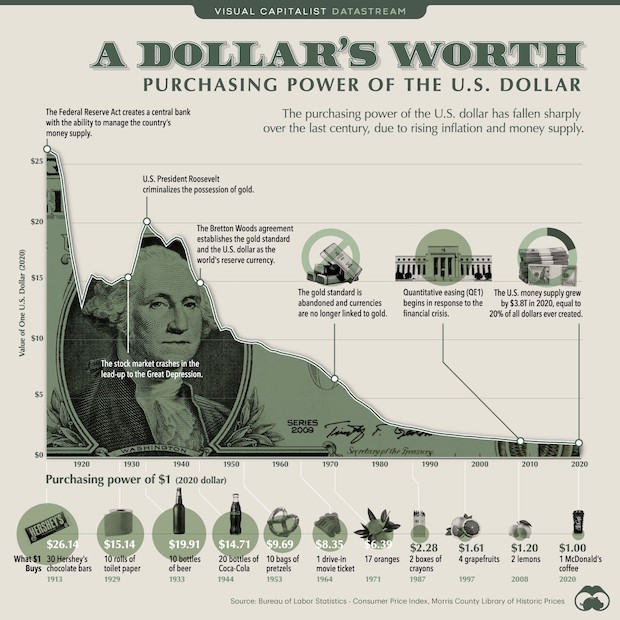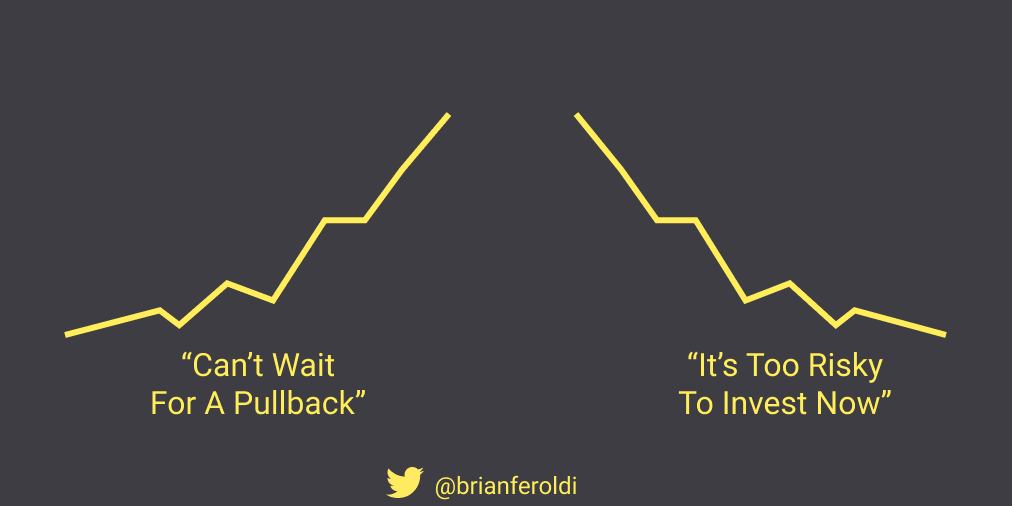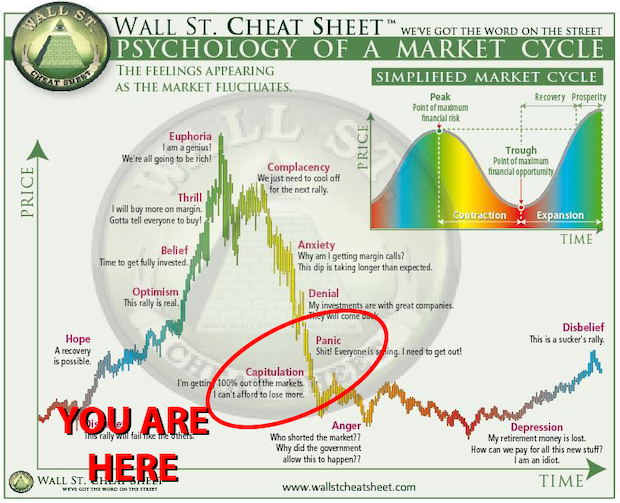Potential wealth is determined by when you learn to invest.
I wasted the early part of my life not understanding basic investing methods. So I left my money in a savings account and got peanuts.
I’d have retired at 30 years of age had I not made this major mistake. Later in life I became obsessed with investing and read every book on the topic.
These investing methods are what the greats taught me. Learn them … or re-learn them if you’ve forgotten any.
The greatest lie about investing ever told
If you read enough finance books you’ll be told the lie that you get rich from investing by buying index funds.
It does my head in. Yuck.
I don’t have any wealthy friends who bought index funds and got rich off them. This is advice for average people who’ll likely only ever get wealthy when they’re 75 and too old to enjoy the cash.
Wealthy people get rich from a portfolio of small bets, owning businesses, acquiring real estate, creating digital assets, and building their network.
Stop falling for the index fund method. It’s a joke.
Historians make the most money
Wait, what? “Those cranky bastards?” Yes.
A friend of mine is an amateur investor. Every time we chat he references some event he feels is unprecedented.
The only reason every world event looks unique to him and affects how he invests his money is because he hasn’t studied history.
When you do, you realize a global bat virus, war in Europe, or supply chain issues are nothing new.
History may change. Sure. But how humans behave throughout history never does. Our actions are predictable, and greed almost always enters the scene. That makes judging events that affect investing damn easy.
Study history to get rich from investing.
Hold cash during a raging bull market
Wait … what, WHAT?
(This article is not full of cliche BS crap you’ve heard before. It’s designed to slap you across the face and wake you up.)
The investing gurus will say cash is trash. Depends on how you look at it.
Holding cash during a bull market means you miss out on the gains from assets that go up a lot. It feels like a loser strategy because you focus on all the gains you’re missing out on.
FOMO can take over.
If cash got you a 2% return in a year when the stock market went up 12%, you’d think you lost 10%.
The difference between the two numbers in your head will sound like a Mack Truck driving down your hallway.
What’s missed is this…
Sure, in a bull market cash is crap. But when an unpredictable bear market/ recession comes out of nowhere, that cash helps stop you from selling investments to raise money and stay afloat.
That cash can also buy you many investments on discount at the same time. As they say, the stock market goes up over the long term but most of the gains are made in short-term bear markets.
- Cash creates optionality.
- Cash is an insurance policy.
- Cash is peace of mind in a global economic storm.
Smart money is just dumb money that’s been through a crash — Naval Ravikant
Bad investments don’t matter when you’ve got cash flow
The risk with investing is you can lose money.
In life, you can even lose everything because of a divorce, lawsuit, or cancer diagnosis. The temptation is to focus on what you own. I don’t.
What I do is focus on my monthly cash flow.
If I lose all my money (like I have before) then it won’t matter because every month there is new money coming through the door. It’s only when your assets get taken away and you don’t have cash flow that you’re screwed.
Focus on cash flow to become financially unbreakable.
The financial markets can remain crazier for longer than you think
Right now is a crazy time.
Stocks should have tanked further. House prices should be in deep trouble like they were in 2008. But they’re not.
That’s because most of investing isn’t based on logic. The reason is that stories drive price increases. And those stories are driven by incentives.
- Central banks have an incentive not to let the market implode.
- Governments and politicians are incentivized to keep the economy cranking, so they can get re-elected and take home enormous paychecks from their outside political activities.
It’s a bad idea to let negative events in the news affect your investing. The financial markets and reality have been detached for a long time. 2020 showed us.
The worst health crisis one could ever dream up caused the greatest rise in asset prices of modern times.
The solution is to focus on the long term and not get caught up in short-term events you can never predict the outcome of.
Investing looks sweeter than it is
In Australia, I have annoying acquaintances that parade around saying things like “I made 200% on Amazon stock” or “my house went up 60%.”
These people are idiots. Idiots.
What they forget is inflation. It determines the value of your money over time. If you quote investment returns without adjusting for the fact your money is worth less, you fool yourself into thinking you’re a money genius.
These people often don’t calculate taxes either.
It’s nice to make huge investing gains, but the tax bill can be enormous (as I learned the hard way).
Anyone can make money and then tell the tax man “la la la I can’t hear you.” But eventually they’ll have to pay up, and they’ll tell no one.
The only way to fix the tax challenge is to learn about tax efficiency.
You’ll likely need a company or trust to invest in the markets with — rather than your personal name that’ll attract the highest tax rate, due at the most inconvenient time when you don’t want to interrupt the compounding effect of good investments.
The money game is all about outperforming the debasement of currency
Let me quickly remind you in case you’ve forgotten.
Governments and central banks create money out of thin air and can use it whenever they need to. It’s used to fund wars and pay for the harsh realities of a global bat virus that shuts down everything.
When they create money from nowhere it devalues any money you have.
This is called debasement of currency. So a dollar today is worth much less in the future.

Image credit: https://www.visualcapitalist.com/purchasing-power-of-the-u-s-dollar-over-time/
If you just invest in stocks, bonds, or safe real estate it’s likely you won’t be able to outperform debasement of your country’s currency in real terms.
The only popular way to do so is to own tech stocks and cryptocurrencies over the long term to make up for the performance gap.
Most people have no clue about this, so their investing returns create fake dopamine spikes that are really underperformance in disguise.
Investor psychology matters more than you think
The most popular finance book in recent times is “The Psychology of Money.” I’m not going to quote it because it’s been overdone, but it does highlight a powerful fact.
Those who make money investing have trained their psychology to do so.
Take this diagram for example…

Image credit-Brian Feroldi via Twitter
The left side is a bull market. The right side is a bear market. If your investor psychology is left unchecked you’ll likely think either of these two thoughts: 1) “Can’t wait for a pullback 2)It’s too risky to invest now.
Both will cause you to miss life-changing opportunities and they’re our default thoughts given to us through human evolution. They’re enormously hard to override.
Here’s another investing psychology cheat sheet from Wall Street:

Image credit-wallstcheatsheet.com via twitter
This chart is the story of financial markets.
It’s repeated for all of human history. Right now we’re approaching the red on the chart. But before we know it the anger and panic of the red market cycle psychology will turn into green again.
The best psychology for when markets are down comes from my friend Kenny: “This bear market is an opportunity to buy a little bit of my freedom at a 20% discount.”
The powerful concept of liquidity
Most people don’t know the difference between liquid and illiquid.
Don’t worry, until a few years ago I had no clue either — and I worked in a bank!!! Haha. Liquidity is how easy it is to turn an asset back into cash.
- Illiquid assets are hard to cash in such as real estate, businesses, machinery, stock options, etc.
- Liquid assets are easy to turn into cash such as stocks, crypto, gold, and cash.
When bad times strike everyone races for the emergency exit at the same time. That’s the hardest time there is to cash in illiquid assets. And it’s complex and can take time.
So as a result the drop in value is enormous.
Whereas liquid assets can quickly save your ass and help you pay bills if needed. Most people don’t have enough liquid assets, and that’s why they are so vulnerable to the global economy.
Own both liquid and illiquid assets to become wealthy.
This article is for informational purposes only, it should not be considered financial, tax or legal advice. Consult a financial professional before making any major financial decisions.


